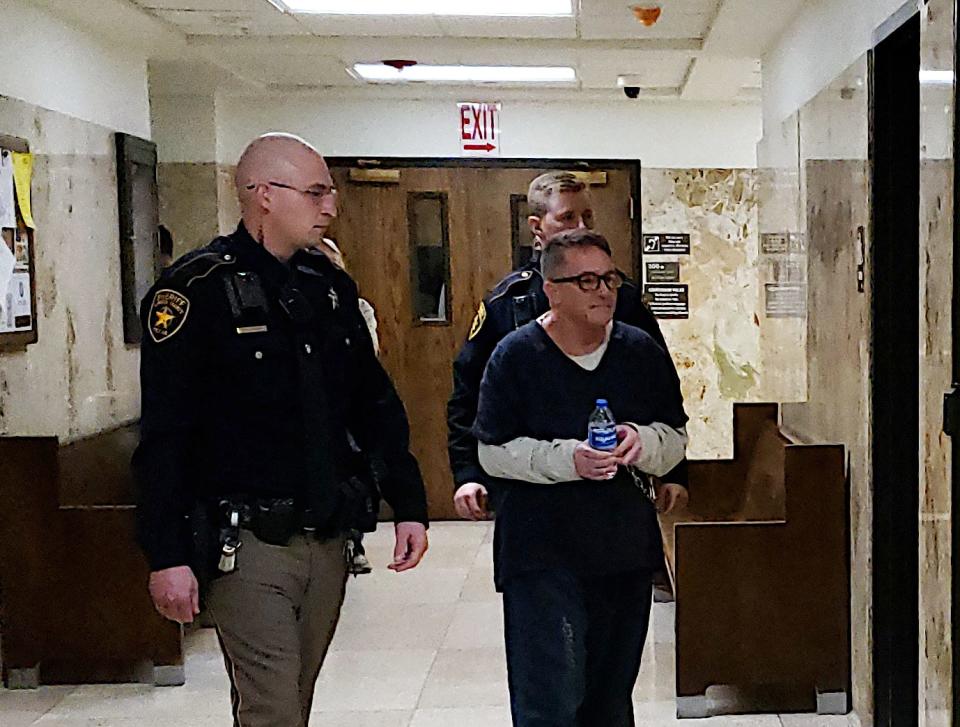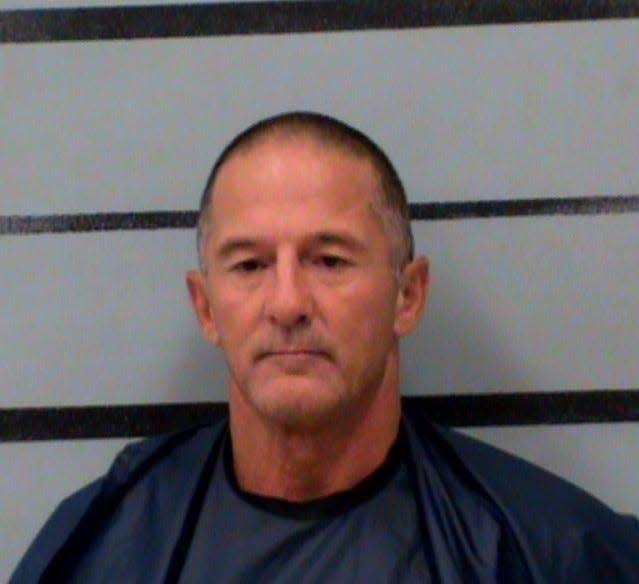David Hampton handed 50-year sentence in beating, strangling death of Celestino Rodriguez

A week to the day after pleading guilty to the strangling and beating death of 79-year-old Celestino Rodriguez, David Hampton sobbed as he testified in court, characterizing himself as an unwilling participant the man's death, saying he only hit the man once and denied strangling him.
On Friday, 137th District Judge John McClendon told Hampton that based on the evidence and testimony from other witnesses during a three-day bench trial, that he was more involved in Rodriguez's death than he testified to on the witness stand.
"The only way that those injuries (on Rodriguez) could have happened were by Mr. Hampton causing them," McClendon said. "The idea that you would toss a body into a culvert and that would somehow caused those injuries make no sense."
McClendon's ruling came after a bench trial on Hampton's punishment during which prosecutors put on evidence that Rodriguez was an elderly, lonely, vulnerable target killed as a result of a plot cobbled together by desperate people caught in the tight grip of methamphetamine addiction.
Hampton, who has been held at the Lubbock County Detention Center since Aug. 20, 2019, faced a punishment between five years to life in prison after he appeared before McClendon on Sept. 21 and entered an open plea of guilty to a count of murder in the Aug. 3, 2019 death of Rodriguez who lived in Slaton.
Hampton is one of seven people charged in connection with the case. Brett Garza, 37, and Heather Casias, 39, are also charged with murder. Casias, who remains held at the Lubbock County Detention Center, was not called as a witness in the case.

Garza, who was provided testimonial immunity, recounted to the court a plan proposed by Casias to rob Rodriguez of a social security payment.
Rodriguez disappearance
Rodriguez's daughter, Patricia Rodriguez-Perez, told the court that his father struggled with depression and loneliness when their mother died nearly a year before. She said he r father, who sometimes needed a cane or a walker to move around, spent his time still working as a truck driver and frequenting game rooms, despite their pleas to slow down.
She said she'd heard that her father knew Casias but didn't know the extent of their relationship, saying her father described her as someone he was helping.
She said her sister, Norma Wallace, reported their father missing on Aug. 3, 2019, to Slaton police when he never returned home after saying he was getting an oil change in Lubbock. She said her extended family spent the next two weeks traveling through Lubbock searching for him, not knowing he was already dead.
Meanwhile, Garza said Casias, who worked as a prostitute, approached him with a plan to rob Rodriguez of a debit card, saying she knew he would be getting a social security payment soon.
Garza said Casias was hoping to use the money for an apartment so she wouldn't have to keep moving her children to different motels.
In the weeks leading to the robbery, Garza said he, Casias, and Hampton were together almost everyday smoking and dealing methamphetamine.
Garza said he recruited Hampton, who he's known after multiple stints in jail, to help execute the plan. However, he initially said plan didn't involve hurting Rodriguez during the robbery, saying he believed the plan was to tie up Rodriguez, take his card and let him go once they withdrew the money.
Though, he did admit to ordering Hampton to strike the elderly man.
Plans fall apart
Garza said on day of the robbery, Casias called Rodriguez over to an apartment where one of Hampton's friend's stayed, and she would drive the elderly man to a trailer home near Erskine and FM 179 that was owned by another one of Hampton's friends.
He said Rodriguez arrived in a white 200 Chrysler, let Casias take the wheel and he and and Hampton followed them in his tan Chevrolet Suburban.
However, Garza said the plan immediately fell apart once they got to the arranged location.
He said Rodriguez, who was in the passenger seat, began struggling with Hampton, who struck the elderly man in the chest once and then missed a second punch, which glanced on Rodriguez's shoulder.
Garza said Hampton managed to push Rodriguez's body over the Chrysler's console and he kneed the elderly man's head to pin it to the driver's seat, while Hampton searched the man's pockets.
The next steps were improvised out of panic, Garza said.
He said Hampton climbed into the back seat of the vehicle and he handed Rodriguez to him so he could get in the driver's seat and drive the car away.
He said as he backed out of the driveway, he could see Hampton's arm over Rodriguez's neck.

Garza said he began driving until the paved road turned in to a field and they left Rodriguez, who he believed was alive but unconscious, face down on the ground.
He said he and Casias left in the suburban and Hampton drove Rodriguez's vehicle where they left it a house Hampton rented near Eighth Street and Vicksburg.
Hampton's roommate, Toby Daughtry, told the court Hampton told him not to use the car, saying they got it after "they beat the hell out of man."
However, Daughtry admitted to driving the car with Amanda Blagburn to Milam County where they left it once they learned the full story.
Blagburn, who is also a friend of Hampton's, told the court Hampton told her to get rid of the vehicle.
Daughtry and Blagburn were charged with unauthorized use of a motor vehicle and have pleaded guilty.
Meanwhile, Garza said he Casias and Hampton went to multiple stores where they used Rodriguez's debit card.
Lubbock police detectives presented the court with records of Rodriguez's bank accounts and images from security cameras that show Garza, Hampton and James Anderson using the stolen debit card.
Anderson, told the court he was summoned by Garza to the Tech Inn where Garza, Hampton, Casias were staying.
He said Garza took sole responsibility for killing Rodriguez and needed help moving his body when they learned that Rodriguez's family were searching for him all over Lubbock.
Anderson said Garza promised him $3,000 and a 1/2 pound of meth for his help. He said he was never paid and Garza threatened his family.
Anderson said Freddie Salinas, who is a family friend, also helped move Rodriguez's body to Abernathy where it was eventually found in a culvert.
Anderson was sentenced to 10 years in prison after pleaded guilty to a count of tampering with evidence for his role in the case. Salinas, who is out on bond since December 2020, still faces an evidence tampering charge.
Rodriguez's disappearance was initially investigated as a missing persons case. Garza was identified as a person of interest in on Aug. 9, 2019 after detectives identified him from footage from security cameras as they looked into transactions on Rodriguez's debt card.
Lubbock police arrested Garza on Aug. 14 and charged him with debit card abuse.
Garza, whose case is still pending, said he wasn't testifying in exchange for a favorable plea deal but to tell Rodriguez's family what happened to their loved one.
"I'm hoping I get what I deserve," he said.
He said he believed he deserved to spend 50 years or more in prison. However, he said was hopeful for 30 years or less.
Shortly after, Garza confessed to investigators that he and Hampton killed Rodriguez. Soon after, the rest of the co-defendants were arrested in Lubbock.
Hampton was arrested on Aug. 15, 2019 in Abilene where he'd stayed with relatives for about a week after surrendering to police there.
A Lubbock forensic investigator told the court Rodriguez's body was in advanced stages of decomposition and nearly skeletal.
A medical examiner told the court that a full autopsy wasn't done because of the state of decomposition. However, he found that Rodriguez had broken ribs and a broken hyoid bone, which was consistent in strangulation deaths.
Anderson told the court that after his arrest, he and Hampton were placed in the same jail pod in Lubbock.
He said Hampton told him that when they robbed Rodriguez, the elderly man attacked Garza and Hampton put an arm around Rodriguez's neck to pull him off Garza. He said Hampton told him he felt Rodriguez's last breath and that the man died in his arms.
Pamela Lynch told the court that her brother arrived unexpectedly at her home in Abilene with distressing news.
"He showed up and he told me that he might have killed a man, or he hurt him really bad, or he might have killed him," she said.
In her living room, Lynch said Hampton told them that Garza asked him for help "roughing up" Rodriguez because he disrespected Casias and "needed to be taught a lesson."
She said Hampton told her that he heard Rodriguez's last breath.
Lynch told the court Hampton stayed for about a week at her home where they used methamphetamine. She said she encouraged her brother to surrender to the police.
Lynch described his brother as a loyal friend but not a violent man.
James Setser, Lynch's son, told the court that his uncle's story would change as far as whether or not he hit Rodriguez. However, he recalled his uncle telling them that he felt Rodriguez's last breath.
Setser said his daily methamphetamine use might have affected his memory.
"My whole life's a blur," he said.
However, he said he did not use the drug before coming to testify.
He said at some point, Hampton told him that he hit Rodriguez as Garza kneed him. However, he said that Hampton told him that Garza "overdid it."
"I don't think we got the full story," he said.
He describe Hampton, Garza and Casais' actions as "cowardly."
Hampton's version
During his testimony, Hampton told the court that he was never told about a plan to rob Rodriguez and denied strangling the man or making the statements his family members testified he told them, particularly about hearing Rodriguez's last breath.
Hampton began his testimony with a history of physical abuse at the hands of his step father. The trauma of the abuse set him up for a lifetime of drug addiction starting when he was about 8 years old huffing paint. When he was 13, a friend he was smoking marijuana introduced him to methamphetamine, which he was given intravenously.
"My life wasn't the same since," he said.
He said his drug addiction led him to a life of crime that included multiple prison sentences.
He said his addiction cost him jobs, which included working for the city trimming trees at parks.
He said in the weeks leading to his involvement in Rodriguez's death, he'd been selling and using methamphetamine daily.
He said Garza called him on the day of the crime, asking for his help using a debit card in exchange for drugs.
He believed Casias was meeting Rodriguez for prostitution and would pay them with his debit card, which Hampton would help get money from.
However, things went downhill quickly, he said when Garza pulled up behind Rodriguez's white car and began beating the old man.
He told the court that he was stunned and slowly made his way to the front passenger seat and saw Garza hitting Rodriguez with his knees and fists.
Hampton said when he opened the passenger door, Rodriguez kicked him and he struck the old man in the belly on reflex.
After that he told the court he yelled at Garza to stop beating Rodriguez.
"He just wouldn't quit, he just kept hitting him. kneeing him," he said.
He said Garza screamed at Rodriguez to stop fighting back.
Hampton said he was frozen in shock and too scared to stop Garza. So he said he went to the Suburban with Casias, telling her "What the hell is wrong with you people?"
At some point, Garza stopped yelling and Hampton said he returned to the white car where Rodriguez had stopped fighting back.
He said he sat in the back seat with Rodriguez who laid limp but was still breathing.
Garza began driving the car and Rodriguez jostled in back seat multiple times slumping over Garza, who would knock Rodriguez back.
Hampton said he grabbed and held Rodriguez to stop him from slumping over Garza.
He denied putting his arm around Rodriguez's neck as Anderson described.
He said remembers getting down on the floorboard of the vehicle, crying as Garza drove to the field where they left Rodriguez's body.
He said he drove Rodriguez's car because Garza and Casias left him there.
During his testimony, Hampton broke down and bawled as he begged Rodriguez's family, who were in the courtroom, for forgiveness.
"If there's any way you can forgive me, please please, forgive me," he said. "I'm sorry."
Rodriguez's family looked away as they sat in the gallery.
Hampton, who said he has an IQ of 79 indicating below-average intelligence, acknowledged in court that he had already pleaded guilty to murder, which included language that he strangled and beat Rodriguez.
Hampton said he pleaded guilty "because it's the right thing to do," but appeared to be under an erroneous interpretation of the law of parties.
"All you have to do is place me there," he told prosecutor Barron Slack.
Under the law of parties, mere presence does not make someone criminally responsible for another's crime.
To be charged with a crime under the law of parties a person must at least act "with intent to promote or assist the commission of the offense, he solicits, encourages, directs, aids, or attempts to aid the other person to commit the offense," according to the Texas Penal Code.
Hampton said since his latest incarceration he has dedicated his life to Christianity and now hopes to become a pastor.
His defense attorneys called on three pastors who minister at the Lubbock County Jail who told the court about the transformation they've seen in Hampton.
Perry Hallford, the chaplain at the Lubbock County Jail, made a rare court appearance on behalf of an inmate, told the court he believes Hampton was sincere in his faith.
He said he spends his time mentoring younger inmates at the jail to do something positive with his life.
"I try to make up for the bad," he said. "If somebody had been there for me maybe I wouldn't turn out the way I am."
Prosecutor Barron Slack in his closing arguments, didn't ask the judge for a specific prison term for Hampton, but asked him to consider the aggravating factors in the case including Rodriguez's age and the defendant's criminal history that showed he hasn't reformed his conduct.
He said the only people who knows exactly what happened the night of the murder were Rodriguez, Garza and Hampton. He acknowledged that Garza may have also minimized his role in Rodriguez's death, but Hampton was avoiding any responsibility for his actions when he denied testimony from witnesses, including family members, that he had a hand in the elderly man's death.
He said three people who didn't know each other and were separated by about 150 miles, testified that Hampton told them he felt or heard Rodriguez's last breath.
Defense attorney Phillip Johnson argued that his client's addiction and life of crime was a result of him escaping a traumatic childhood.
"He never had a shot," he said.
He told the court that his client was easily manipulated and lacks the skills for deceiving the court by minimizing his actions.
At times during his testimony, Hampton trembled and rocked in his seat, mannerisms, Johnson told the court, seen in many mentally disabled people.
"I'm a schemer," Johnson said. "I'm very intelligent, I know what I need to do to get results three years down the road. (Hampton) is not. What you see is what you get with him."
He said his client's recent transformation in jail was sincere and he deserves a shot at proving that he's changed.
However, McClendon told that the case was ultimately about Rodriguez "and a life that did not deserve to be taken."
He said he believed Hampton's family and friends who testified about Hampton's confessions to them.
"People that came forward that had nothing to gain. poeple that were close to him, even loved him, indicated that his involvement that he told them about was more than what he testified to this week.They had no reason to come in and do that," he said. "Most of them were under subpoena and in fact didn't want to be here, but they came in and told the truth."
McClendon told Hampton that he believed he was sincere in his faith and hoped that he achieves his dream of becoming a minister.
However, he said the only place he'll be able to do that is in prison. Hampton will have to serve half of his sentence before he becomes eligible to apply for parole.
"Given your age, I don't know if you can (survive long enough for) parole or not," he said. "But I hope what time you do have while you are there you use it to help other people."
He told Hampton that he could use himself as an example for other inmates not to return to prison. He described Rodriguez's family, who sat in the courtroom and comforted each other throughout the trial as a "strong family unit."
"Perhaps in some small way it will repay your debt to the Rodriguez family," he said. "I don't know if that can ever be repaid, but I guess we'll see."
This article originally appeared on Lubbock Avalanche-Journal: Judge hands down 50 year sentence in 2019 murder case

